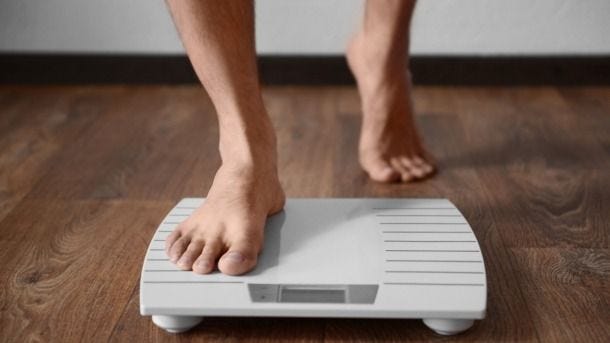4 Steps for Safe Weight Loss for OSA
Studies have shown that even non-obese people who have obstructive sleep apnea (OSA) are likely to have fatty tissue build up in the neck area, which loosing weight can mitigate. In actuality, only about 50% of patients diagnosed with OSA are considered obese.
In the study published in the American Journal of Respiratory and Critical Care Medicine, fat deposits in the neck (from the hard palate to the vocal chords) were measured by magnetic resonance imaging. The conclusion was that even non-obese patients with sleep apnea have excess fat deposits. Fat is especially stored in front or to the side of the upper airway. This article address safe weight loss for OSA.
 We asked noted sleep doctor Brandon Peters to give us some advice for CPAP patients who want to loose weight to counter the effects of OSA. Dr. Peters is a board certified sleep doctor. He also operates the Verywell website and his own personal website.
His advice is this:
We asked noted sleep doctor Brandon Peters to give us some advice for CPAP patients who want to loose weight to counter the effects of OSA. Dr. Peters is a board certified sleep doctor. He also operates the Verywell website and his own personal website.
His advice is this:
Safe Weight Loss for OSA is Possible
Exploring similar questions, numerous studies have extrapolated the relationship between OSA and weight gain. These studies show that OSA worsens with increasing weight, and improves substantially with safe weight loss. One of the most pressing issues with OSA is that it seems to be a vicious cycle. Weight gain causes OSA which then causes more weight gain. Instinctively, the sleep-deprived brain changes the levels of appetite suppressing hormones. This leads to weight gain, and the increased fat around the neck from obesity acerbates the OSA.Guidelines for Safe Weight Loss for OSA
That is why the American College of Physicians (ACP) published guidelines around the most effective treatment for sleep apnea. Weight loss and the use of a CPAP (Continuous Positive Airway Pressure) machine as the initial therapy is recommended. Even a sustained weight loss of just 5% can improve the severity of OSA, and possibly even cure it. A study which was published in 2014 by Kuopio University Hospital in Finland monitored 57 moderately obese adult patients with mild OSA for 12 months. These participants followed a supervised weight loss program of diet and exercise. After 4 years, the university followed up with the study participants. Those who had lost at least 5% of their body weight saw dramatic improvement in their OSA. Participants who were able to maintain their weight loss reported an 80 percent reduction in progression of OSA.Losing Weight is a Good Goal for Most People with OSA
For many people, losing weight seems to be a very good goal when they are diagnosed with OSA. It is always important that before starting a diet and exercise program to check with a physician. This article will provide 4 steps for diet and weight loss specifically for people suffering from OSA who are also overweight. Before we get into the specifics, there is one more thing to mention. Losing weight and keeping it off is typically a difficult proposition. It is something that is a lifelong commitment, but in the end, the benefits far outweigh the work involved.Steps for Safe Weight Loss with OSA
- Step 1. The first step before starting any diet or exercise program is to meet with your doctor to discuss your dietary needs and create a nutrition plan. You should also discuss an exercise program.
- Step 2. Always use your CPAP when you sleep or nap. By getting enough sleep (between six and eight hours of sleep per night) you will also lower stress and reduce the hormones that cause you to want to eat. CPAP treatments are the most effective form of treatment for sleep apnea. This means that using the treatment will help you lose weight if you suffer from this sleep disorder. In addition, getting a better sleep will provide you with more energy for exercising.
- Step 3. Begin a weight loss exercise routine. The Centers for Disease Control and Prevention (CDC) recommend exercising for weight loss because physical activity increases the number of calories your body burns, and combined with limiting your food intake creates a "calorie deficit" that results in weight loss. In order to lose a pound, you need to burn 3,500 calories. So if you're burning 500 calories in one half hour workout, it will take you around a week - 7 workouts - to lose one pound. If you cut your calorie intake by 500 calories in addition to burning 500, it will only take you 3 and half days to lose a pound.
You Can Lose Weight Gradually Too
If you want to gradually lose weight, plan to exercise moderately more than three hours a week and keep your diet consistent. Moderate aerobics burn more body fat if you can keep up the intensity near 70 percent of your maximum heart rate. The idea is to gradually increase your 30-minute workout to about one hour a day as your exercise goal. Many people just starting a weight loss program have a lot of weight to lose, and even a moderate aerobic program is tough to begin. If this is your situation, begin with light weight training, doing a decent number of repetitions and targeting all body parts, and combining that with walking. Even though we suggest this starting point, the best exercise to lose weight is the exercise you are most likely to do and stick with. Also remember to be patient and to modify your diet. It likely didn’t take only a few months to put on the extra weight, so don’t expect to take it off in just a few months. Commitment and perseverance are key.Maintain Your Weight with Exercise
Once you have reached an optimum weight, the CDC recommends exercising at least 150 minutes of moderate-intensity aerobic activity or 75 minutes of vigorous-intensity aerobic activity each week to keep the weight off and receive the health benefits of exercise. One problem with any exercise regime is that if you do not vary it often, it becomes boring which increases the desire to skip it. Keep it interesting and varied. Alternating between high and low intensity and incorporate cross-training with many different exercises during your workout is a way to keep progressing and interesting. This technique also uses different muscle groups so you are less likely to get an injury that results from wear on your joints. On days that you just can’t bring yourself to do an entire exercise routine, you can try breaking it into 10 minute aerobic exercise segments during the whole day and still burn the same amount of calories. Remember to also rest. Tired and sore muscles will prevent improved results You should exercise at least 3 hours before bedtime so that your body has sufficient time to cool down, and early morning (before eating breakfast) burns the most calories.Other People Have Done this - Are there Tips?
The following proven tips may help you begin and sustain a weight-loss focused exercise regime.- Use an App, Fitness Tracker or Log your steps. Keeping track of your calories every day can be very motivational. It’s also nice to look back and see what you've accomplished every week. Many fitness trackers also record your heart rate so you can be sure you are working out at the right intensity, and have a social feature so you can inspire or receive motivation from others.
- Work Out with Someone Else. Partners will keep you motivated, accountable and you will likely enjoy doing the exercise more. You might even push yourself harder and meet your fitness goals more quickly.
- Keep to a Schedule. If you treat your workouts like appointments and plan them ahead of time, you won’t have an excuse to avoid them. In addition scheduling workouts allows you to vary them and ultimately avoid boredom.
- Weigh yourself at the Same Time Every Day. If you do this, you won’t be surprised and let extra calories or missed workouts set you back. This is a switch from what was previously thought before studies showed that the scale is the dieter’s friend!
- Ease Into the Exercise Routine. If you begin an exercise routine slowly, there is less likelihood that you will hurt yourself and either give up or have to put the routine on hold until you heal. Also find something active that you love and incorporate it into your exercise routine. You shouldn’t dread working out.
Cutting Calories for Safe Weight Loss for OSA
Step 4. The final, and most important step is to cut calories. The recommended minimum caloric intake for adults to maintain weight is 1800 calories for women and 2400 calories for men, but this varies based on activity and age. In 2009 a study was published that restricted dietary intake to 550 calories for men who were obese and had OSA. The study resulted in the weight loss group losing 42 pounds on average after nine weeks. They also cut the number of apnea events in half. The diet consisted of drinking a nutritious liquid for 9 weeks, and after that transitioning into a 1500 per day diet that incorporated some solid food. Since most people don’t want to change their eating habits that drastically, work closely with a physician or nutritionist, and don’t expect to lose over 4 pounds a week; there are other weight loss diets that can help. The overriding goal is that that weight loss does correlate to fewer apnea events, in some cases alleviating the need for CPAP all together.What Sleep Doctors Say
Dr. Brandon Peters
 We asked noted sleep doctor Brandon Peters to give us some advice for CPAP patients who want to loose weight to counter the effects of OSA. Dr. Peters is a board certified sleep doctor. He also operates the Verywell website and his own personal website.
His advice is this:
We asked noted sleep doctor Brandon Peters to give us some advice for CPAP patients who want to loose weight to counter the effects of OSA. Dr. Peters is a board certified sleep doctor. He also operates the Verywell website and his own personal website.
His advice is this:
"Although being overweight or obese may worsen the risk of sleep apnea, it may not be the only contributing factor. As a general rule, a 10% body weight reduction can be helpful. Here are some general recommendations: Measure and record weight at the same time every day, like after a morning shower. Eliminate empty calories including junk food such as soda pop, candy, and fast food. Try to eat more fruits, vegetables, and whole grains. Cut portion sizes by putting food back after fixing a plate. Get 30-60 minutes of aerobic exercise daily, including low-impact activities such as walking or swimming."Dr. Peters also suggested further reading: Sleep Apnea Risk May Persist After Weight Loss How Does Being Overweight or Obese Affect Your Risk of Sleep Problems? How Weight Loss May Improve Your Sleep Calculate Your Body Mass Index We asked a second board-certified sleep physician about whether or not losing weight can help with OSA. Here is what he said:
Weight loss can be very beneficial. In fact in some instances it can eliminate sleep apnea. Examples would be massive weight loss such as bariatric surgery can eliminate sleep apnea in 60% of patients. In patients with mild sleep apnea, even modest weight loss, can effect a significant change in sleep apnea. Finally weight loss can result in a decrease in the level of pressure required to keep the airway patent which may be more comfortable.In order to lose weight, he recommends watching your calorie intake closely. He also says to avoid foods with a high glycemic index (that is, foods that raise the blood sugar rapidly). Eating plenty of fruits and vegetables is the best way to satisfy an appetite without raising blood sugar. It's also important to monitor the amount of calories of added (sugar content) of what you eat. Women should get no more than 100 calories or about 6 teaspoons of sugar per day and men no more than 150 calories or 9 teaspoons per day. Finally, avoid all foods with high fructose corn syrup; fructose does not suppress the areas of the brain that control appetite, so you will still be hungry even after you eat. Most importantly, exercise regularly.
Tips to Help you Keep on Track with Weight Loss
By speaking with your own physician, you can come up with a custom weight loss plan that works around your specific needs. No matter what diet plan you choose there are a few helpful diet tips that can keep you on track:- Cook more often. If you do have to eat out, limit your portion size to about the size of your fist. . However, Cooking at home allows you much more control over the number of calories used (like baking rather than frying). Try to eat out only for special occasions, and ask friends to meet you for a walk instead of a drink. The bonus is that it will also save you money!
- Avoid alcohol. Even a glass of wine or beer can add a hundred or more extra calories, and hard liquor even more. Then, after a few glasses, a person is more likely to consume more calories in a meal. Drinking just two standard alcoholic drinks causes a 73% reduction in your body’s fat-burning process. In fact, the beverage of choice when you are on a diet is plain water. So Drink more Water!
- Have a plan for events. In order not to get sidetracked eating lots of calories before dinner even starts at an event, go armed with a plan. One way that works for many people is to eat a light meal so that you do not arrive at the event hungry. This makes it much easier to avoid the bar and the appetizers!
- Sit at a table whenever you eat. This makes meals special and discourages snacking. Never eat while you are watching television, reading, or are surfing the internet. Unconscious eating adds calories quickly.




